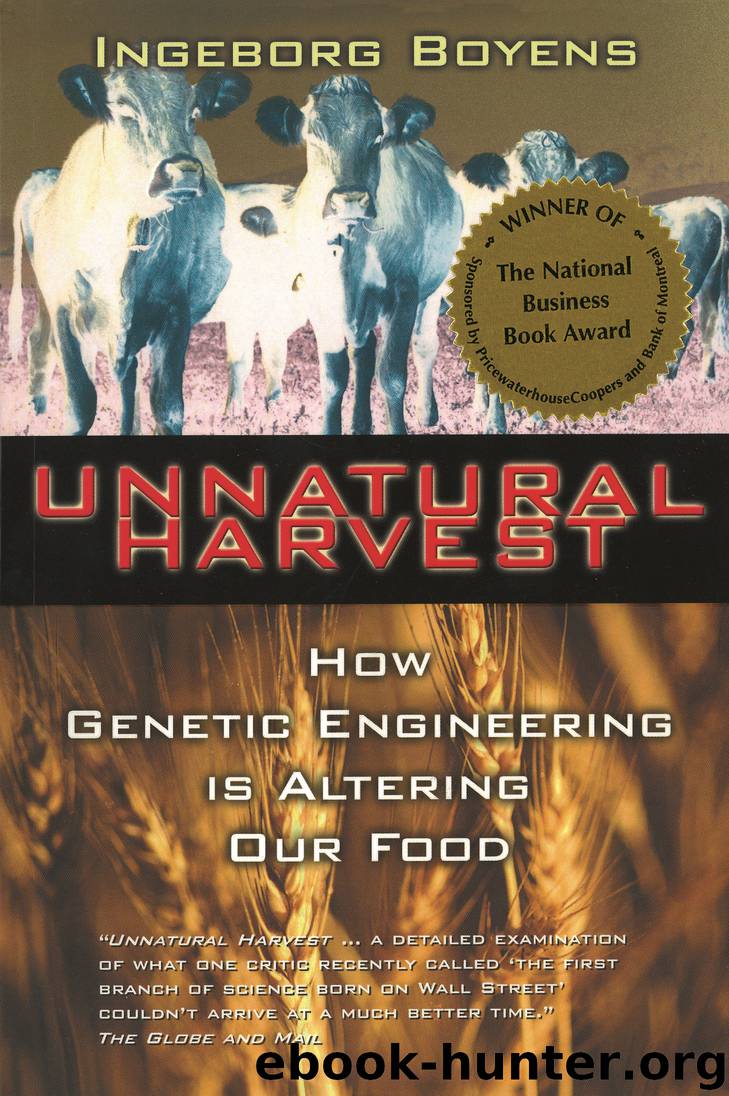Unnatural Harvest by Ingeborg Boyens

Author:Ingeborg Boyens
Language: eng
Format: epub
Publisher: Doubleday Canada
Published: 2018-03-27T04:00:00+00:00
* * *
—
It is tempting to believe we can get the irritants of farming under control. An exhibit at the Epcot Center in Florida’s Disney World imagines a high-tech agriculture where all the variables are controlled: plants are held up by mesh rather than messy dirt; nutrients are supplied at precise intervals by an automated flow-through system; air is filtered and sterilized to prevent the introduction of insects and disease.
This perfect world is, and will continue to be, a fantasy. Biotechnology’s attempts to create it are doomed because, as Francis Bacon said centuries ago, nature is ultimately in charge—it will simply mutate and adjust to human efforts to create life. Our exercise in attempting to master nature may, in fact, backfire in the elimination of many natural species. We may soon come to a point where all the crops in the fields are artificial, the flowers in our garden are genetically engineered for color, and the trees in the forest are manipulated to grow faster and produce more wood. Jeremy Rifkin asks, “Do we want our children to grow up in a world where the genetic codes of plants, animals, and humans are interchangeable and living things are programmed as engineered products with no greater intrinsic value than autos or microwave ovens?”
Many people fear the consequences of genetic engineering will be much more than just aesthetic. Mae Wan-Ho writes, “The large scale release of transgenic organisms is much worse than nuclear weapons or radioactive nuclear wastes, as genes can replicate indefinitely, spread and recombine. There may yet be time enough to stop the industry’s dream turning into a nightmare, if we act now, before the critical genetic ‘meltdown’ is reached.”
Corporate biotechnology is using the desperate financial situation of today’s beleaguered farming community to sell its products. It is a question of short-term gain for long-term pain. There is already ample evidence to suggest that the release of genetically engineered crops into the environment has been premature and ill-advised. These crops may promise convenience and efficiency for farmers, but that is unlikely to last. A return to more toxic and hazardous products, within just a few years, seems inevitable. Of course, biotech corporations can always devote their research energies to finding the next solution to the side effects of their gene splicing. There will always be business in trying to stay ahead of the bugs and the weeds and the other furies of Mother Nature.
Download
This site does not store any files on its server. We only index and link to content provided by other sites. Please contact the content providers to delete copyright contents if any and email us, we'll remove relevant links or contents immediately.
The Lonely City by Olivia Laing(4802)
Animal Frequency by Melissa Alvarez(4474)
All Creatures Great and Small by James Herriot(4322)
Walking by Henry David Thoreau(3962)
Exit West by Mohsin Hamid(3828)
Origin Story: A Big History of Everything by David Christian(3692)
COSMOS by Carl Sagan(3625)
How to Read Water: Clues and Patterns from Puddles to the Sea (Natural Navigation) by Tristan Gooley(3469)
Hedgerow by John Wright(3363)
How to Read Nature by Tristan Gooley(3341)
The Inner Life of Animals by Peter Wohlleben(3319)
How to Do Nothing by Jenny Odell(3302)
Project Animal Farm: An Accidental Journey into the Secret World of Farming and the Truth About Our Food by Sonia Faruqi(3221)
Origin Story by David Christian(3202)
Water by Ian Miller(3188)
A Forest Journey by John Perlin(3077)
The Plant Messiah by Carlos Magdalena(2935)
A Wilder Time by William E. Glassley(2863)
Forests: A Very Short Introduction by Jaboury Ghazoul(2842)
